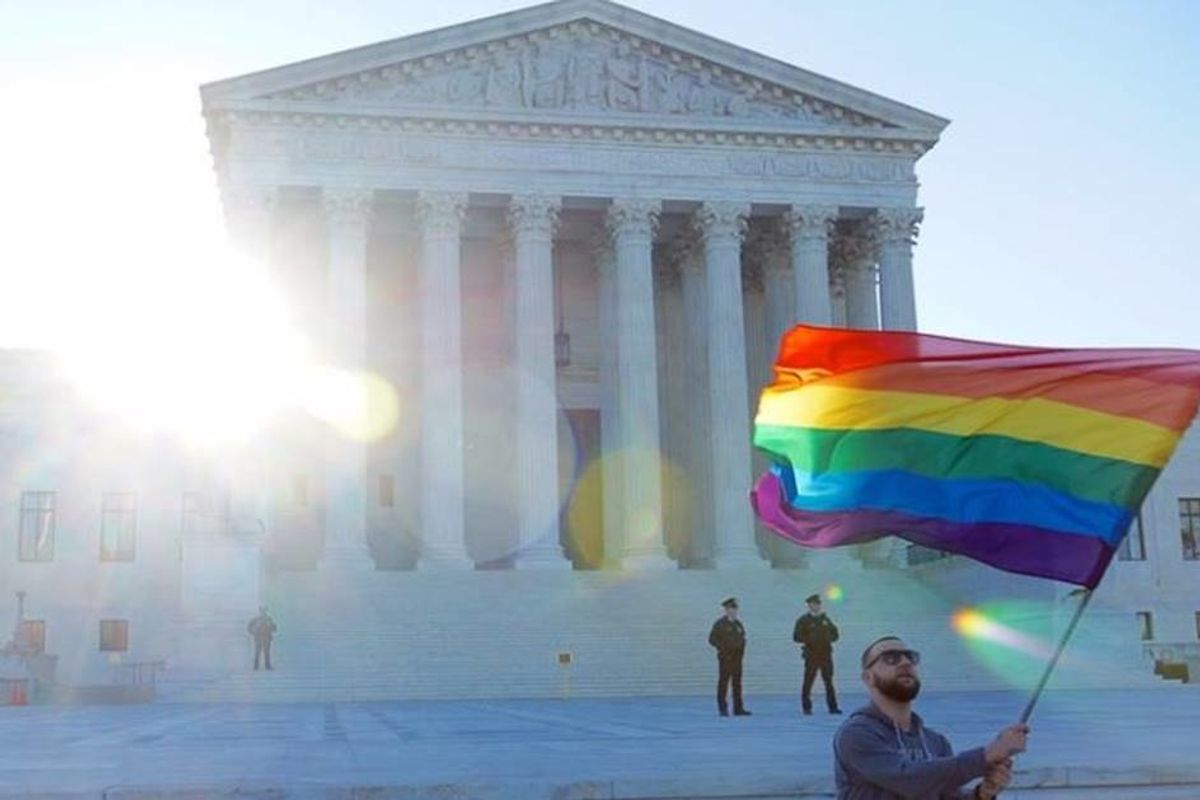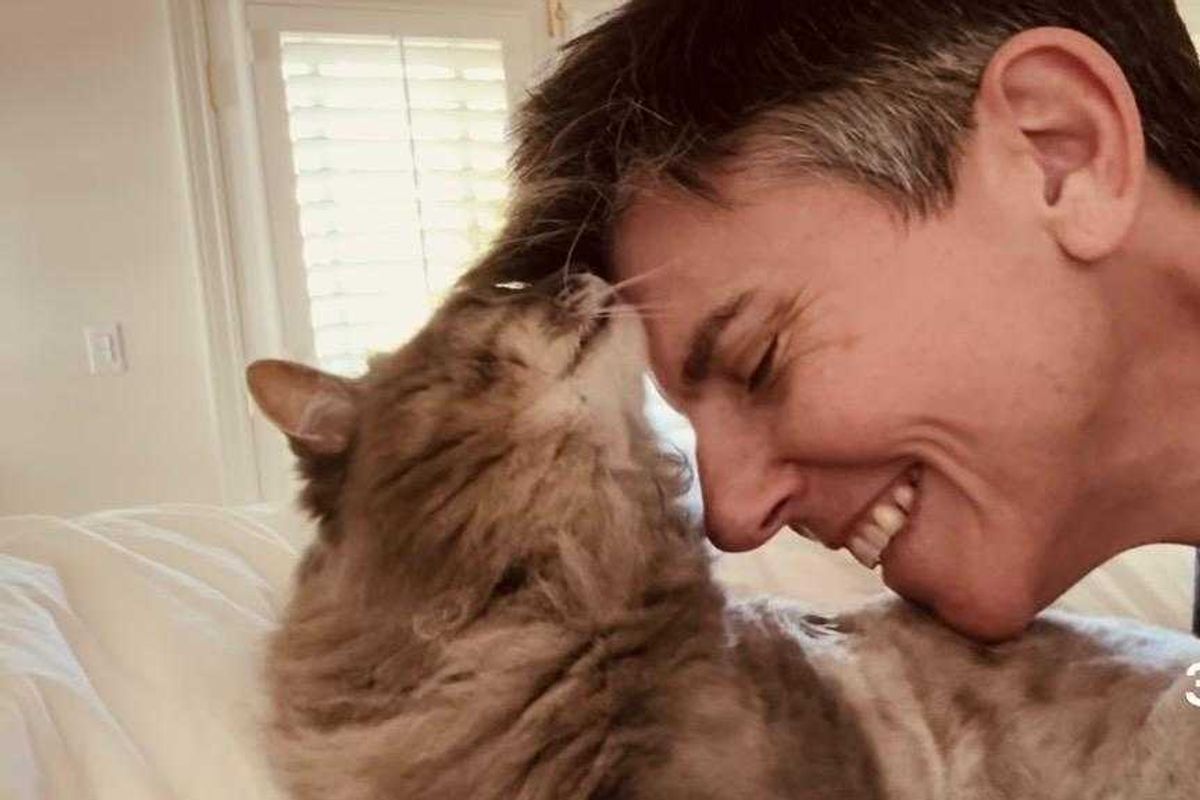Legalizing gay marriage has caused a dramatic drop in LGBTQ suicide rates
A victory for America.

In June 2015 The Supreme Court of the United States declared same-sex marriage legal in all 50 states.
The legalization of gay marriage granted over 1100 statutory provisions to same-sex couples, many of them granting rights and privileges previously only afforded to heterosexual couples.
After the decision, President Barack Obama said the ruling will "strengthen all of our communities" by offering dignity and equal status to all same-sex couples and their families.
He called it a "victory for America."
However, the law didn't just benefit same-sex couples who want to get married, it also had a dramatic affect on LGBT youth. Two years after the legalization of gay marriage, the suicide attempt rate among LGBT youth declined significantly according to the Associated Press.
Suicide is the second-leading cause of death for U.S. teens. LGBT teens are five times more likely to make an attempt than their straight peers.
The study was conducted with over 26,000 LGBT youth participants in the 32 states where gay marriage was legalized up through the 2015 Supreme Court decision. The study found that suicide attempt rates dropped 7% among all students and 14% among gay kids after same-sex marriage was legalized in each state.
Part of the drop in suicide attempts by kids who didn't publicly identify that they were gay could be because they were closeted or questioning.
There was no change in states where same-sex marriage wasn't legalized.
While the change in suicide attempts doesn't prove there's a direct connection, researchers believe that the law made LGBT kids feel "more hopeful for the future." They also believe the measures increased tolerance among their straight peers while reducing the stigmatization felt by gay kids.

A study out of Denmark and Sweden published in 2019 found similar results among married gay couples.
Same-sex marriage was made legal in 2009 in Sweden and 2012 in Denmark.
The study found that couples in same-sex unions saw a 46% decline in suicide suicide, compared to 28% of those in heterosexual unions.
"Although suicide rates in the general populations of Denmark and Sweden have been decreasing in recent decades, the rate for those living in same-sex marriage declined at a steeper pace, which has not been noted previously," researchers noted.
These studies show the power that societal recognition can have on stigmatized minority groups. When one is protected by the "law of the land" it means a lot more than what happens in a courtroom or at city hall.
It shows that you are accepted by the community and protected by those in power. For to love flourish — whether it's loving oneself or sharing it with a partner — first it must first be protected.
This article originally appeared on 01.24.20
- Woman who attempted suicide in Japan had her life saved by 20 heroic sumo wrestlers - Upworthy ›
- Anglican bishop supports same-sex marriage - Upworthy ›
- Anglican bishop supports same-sex marriage - Upworthy ›
- Supreme Court uses a transgender woman's preferred pronouns in decision - Upworthy ›
- Happy couples share the serious issue they still face - Upworthy ›
- Woman pleads for men to start doing their chores - Upworthy ›
- Miss Staten Island banned from St. Patrick's Day parade after coming out bisexual - Upworthy ›
- They started dating as heterosexuals in 2004. Now, they've blossomed into a loving lesbian marriage. - Upworthy ›
- 'Marriage: A Story of Love in 28 Parts' has long-time couples rolling - Upworthy ›
- Dan Levy’s mom shared a lovely note on worrying about her 'little boy who loved to twirl' - Upworthy ›
- Same-sex penguin parents Electra and Viola hatch a chick together and it's just adorable. - Upworthy ›
- They were right: Gay marriage 'changed everything.' Well, by adding $3.7 billion to the economy. - Upworthy ›




 Meatloaf was a staple dinner.
Meatloaf was a staple dinner. Spaghetti is still a classic.
Spaghetti is still a classic. Why were pork chops so popular?
Why were pork chops so popular?


 First Lady Jacqueline Kennedy greets guests before a reception for the Wives of American Society of Newspaper Editors Members.via
First Lady Jacqueline Kennedy greets guests before a reception for the Wives of American Society of Newspaper Editors Members.via  A gorilla walking on its knuckles. via
A gorilla walking on its knuckles. via 
 Cooking at home is almost always cheaper than eating out, and often significantly so.
Cooking at home is almost always cheaper than eating out, and often significantly so. Bulk spices often cost a fraction of what they cost in jars.
Bulk spices often cost a fraction of what they cost in jars. Growing your own food can save you money.
Growing your own food can save you money. Biking is free.
Biking is free. Public libraries are treasure troves of free items to borrow.
Public libraries are treasure troves of free items to borrow.